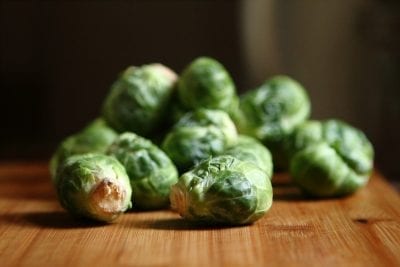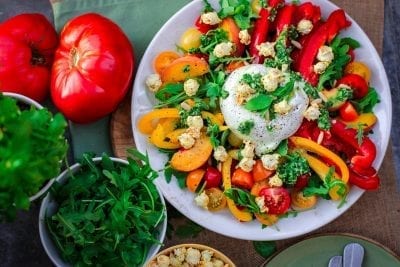Do you eat healthy foods but still find you feel constipated or bloated? “Constipation foods” don’t have to mean you eat pizza or ice cream to feel the side effects. Here are 10 constipation foods that are healthy for many people…but may not be healthy for your body (right now).
HEALTHY FOODS CAN CAUSE CONSTIPATION: WHAT GIVES?!
You do your best to eat “clean” and love how real healthy foods make you feel….most of the time. For some reason, despite eating healthy, you STILL experience constipation or bloating fairly regularly. In fact, you experience it often enough, that you figure your constipation or bloating is normal.

News flash: Constipation and bloating is not normal—at least they don’t have to be.
Constipation and bloating are your body’s way of telling you “something is up.” Something in your food, your lifestyle or your gut is not right, and consequently, your digestion is thrown off.
Here are 10 common healthy foods that cause constipation—and what to do to get to the borrow of why you can’t go #2 or feel bloated more often than you’d like.
1. Nuts
“Nut gut” is real—that feeling of hard feces in your gut, or a bloated belly post almond butter snack time. In essence, nuts are one of nature’s natural healthy foods, however, all nuts contain a protective shell composed of lectins and phytates—chemical compounds actually known as “anti-nutrients.” These anti-nutrients not only are difficult for your digestive enzymes to break down in your belly, but they also bind to other nutrients in other healthy foods you eat to prevent you from absorbing them too.
While soaking and sprouting raw nuts and nut butters and prove helpful, most commercial nuts are not sold this way. In addition, many nut milks on shelves like almond milks contain tons of other gums, carrageenan and fillers that also inhibit maximal absorption and mess with digestion.
Nut Hack:
Soak nuts in waterer 24 hours, drain and dry before consuming. Opt for raw nut butters and sunflower seed butters.
2. Yogurt
Dairy in general is more difficult for the human gut to break down, primarily because most humans do not contain an ample amount of lactase (enzyme necessary to break down lactose in milk products)—yogurt products included. Approximately 65 percent of the human population has a reduced ability to digest lactose after infancy (NIH, 2018). While yogurt and hard cheeses generally contain LESS lactose than other dairy products like milk and soft cheeses, this difference is still small.
Couple this with the fact that most yogurt products sold on shelves are commercially processed, pasteurized, highly heated versions of the “real thing,” and many yogurts are missing out on other natural enzymes that can help your gut better digest them, as well as contain sugars, sweeteners, gums, artificial coloring and other additives.
Yogurt Hack:
Opt for grass-fed full fat raw yogurt, natural coconut yogurt (no sugars, additives) and raw goat’s milk yogurt.
3. Cassava Flour
A common substitute in gluten-free products, often sometimes called “tapioca.” Cassava flour or tapioca starch are derived from the cassava root plan—a natural prebiotic fiber that is associated with constipation, bloating and gas in some (particularly if you have bacterial overgrowth). Since gut bacteria thrive and feast upon fiber, if you already have an unhealthy amount of bad bacteria in your gut, dysbiosis or SIBO, then cassava flour will probably impact you more. Since cassava flour is also not cooked prior to eating (like roasting vegetables), it is also more difficult to digest. Hello constipation, bloating and gas!
Cassava Hack:
Coconut flour and arrowroot starch are generally better tolerated by most people.
4. Chicken Breast or Ground Turkey
Despite the “meat causes cancer” scares of mainstream nutrition advice, the “biggest” scare about meat, like chicken and turkey, is none of these things, but instead: Constipation. Chicken breast and ground turkey are generally leaner versions of meat and when you don’t have enough healthy fat or fiber to digest your healthy foods together, some people can run into constipation issues.
The same thing can be said about any higher amounts of protein we eat, without balancing out carbohydrates and healthy fats. Since proteins are generally dryer healthy foods and require plenty of HCL (hydrochloric acid) in your stomach to break them down, when we eat a lower fat and lower carb diet (often the case on a “clean eating” diet), opting for egg white omelets, lean chicken breast and protein shakes as the base of our meals, “constipation issues” are a given.
Chicken & Turkey Hack:
Take 1 tbsp Apple Cider Vinegar or 2 HCL tablets with protein-based meals; and balance out meals with enough cooked veggies and leafy greens, and healthy fats (avocados, ghee, grass-fed butter, olive oil, etc.)
5. Egg Whites
![]()
Egg whites contain a protein called albumin that many human guts, like lactose, find difficult to digest. In fact, albumin often triggers an allergic response in the body that includes symptoms such as: itchy and watery eyes, hives, rashes, redness and swelling of the skin, stomach cramps, diarrhea, and yes, constipation.
Egg Whites Hack:
Eat the yolks! Opt for pastured eggs and strain out the yolk from the eggs for your morning scramble. Pastured eggs in general are the “gold standard” for the best eggs in town, as they are eggs from chickens that were raised in their natural environment. Experiment with eating whole, top quality eggs as well to see if you feel and taste the difference.
6. Quinoa
Quinoa, like other grains (rice, oats, barley) is a top cross-contaminating food with gluten. Even if you are on a gluten free diet, or do your best to avoid refined breads, pastas and other grain based products, quinoa can be equally difficult to digest. Similar to other grains and nuts as well, quinoa stems from the seed family and contains lectins and phytates on its outer shell that inhibit absorption and optimal digestion of other nutrients, as well as is generally more difficult to break down in your gut.
Quinoa Hack:
Like nuts and other grains, soak quinoa in a bowl of water overnight and strain before cooking. Also eat in small incremental amounts (not daily) to see if digestion improves, or substitute with other more digestible starches like plantains, cooked and cooled sweet potatoes/potatoes, winter squashes and cooked carrots.
7. Brussels Sprouts

Brussels sprouts are part of a special class of carbohydrates called FODMAPS that contain sugars and starches that are difficult for some human guts to digest, particularly if you have bacterial overgrowth or underlying gut issues already. Other “healthy” foods included in the FODMAP family include broccoli, cauliflower, asparagus, coconut, avocados, apples, beans, and high amounts of fruit eaten in a day.
Brussels Sprouts Hack:
Pan roast and fry REALLY well in coconut oil or ghee on the stovetop, or replace with less cruciferous veggies, like cooked/sauteed dark leafy greens, zucchini and yellow squash, winter squashes, roasted carrots, cucumber, celery, parsnips, potatoes/sweet potatoes, snow peas and fermented veggies.
8. Stevia
It may be touted as a “natural sweetener” but stevia still has its bloating and constipation causing ways. Unfortunately, most versions of stevia on shelves in store are NOT the same thing as the most natural version (“Reb A”). Those are often highly heated, processed or synthesized with other ingredients and fillers.
Research is still being conducted to assess the long term side effects of stevia, but preliminary research has found that stevia does further trigger bacterial overgrowth in the human bowel (Denina et al, 2014). And if it is mixed with other synthesized sweeteners (aspartame, surculose, etc.) in products like Truvia, the results are not pretty—constipation and bloating included.
Stevia Hack:
Sweeten healthy foods naturally with a hint of raw honey or pure maple syrup. Consume in SMALL amounts. Opt for products without artificial sweeteners included (monk fruit from raw cucumber may be an exception).
9. Raw Salads

Salads are a go-to staple for many people, especially at lunch. However, lots of raw veggies in a setting may not do body good. Veggies in general are NOT a bad thing, but too much of a good thing is not a good thing. Lots of raw veggies at once, containing lots of fibers and raw materials that require some hardcore digestive juices, don’t do a body good.
In addition, many people neglect adding enough adequate fat to their salads. Some would opt for fat-free dressings or dry green salads, without adding on the essential oils and fats to lubricate the digestive tract and help things flow smoothly.
Raw Salads Hack:
Eat cooked salads. Consider sauteeting your leafy greens the night before. Eat it cold, topped with toppings of choice—including a colorful veggie (like cold sweet potatoes, butternut squash, roasted beets, roasted peppers or carrots), salmon or chicken. You can also put healthy fat (avocado, avocado mayo or coconut flakes). Add a splash of apple cider vinegar or lemon juice for an extra boost to digestion.
10. Green Juice & Smoothies
Green juice and smoothies are like “water” in healthy eating world—essential, right? Except when your tummy cramps, bloats or constipates shortly after sipping up. This can happen for several reasons—for one, smoothies and juices are easy to drink FAST. Also, they contain LOTS of veggie load in a small amount. 5-minutes later, and you’ve consumed 2 servings of leafy greens, a cucumber, an apple, celery stalks and parsley all in one setting! Green juices (and other juices in general) extract fiber from their processing, leaving the veggies—without the fiber—to help move things along.
Some blends can also contain LOTS of sugar from several servings of fruit. This is a lot for any body to digest at once. Lastly, smoothies are EASY to inhale—and “drink” air with them, causing bloating and/or constipation with digestive distress.
Green Juice & Smoothie Hack:
Drink slowly (don’t consume over the course of 15-20 minutes, as opposed to 5 minutes). Opt for ONE fruit in your blends—not 2-4. Chew your healthy foods at meals as much as possible and consume a juice or smoothie as a snack sip if you need some fuel between instead.
The post Warning: 10 Popular Healthy Foods That Can Cause Constipation appeared first on Meet Dr. Lauryn.
Source/Repost=>
https://drlauryn.com/uncategorized/healthy-foods-cause-constipation/ ** Dr. Lauryn Lax __Nutrition. Therapy. Functional Medicine ** https://drlauryn.com/
8 Foods that Cause Constipation in English and Urdu
ReplyDelete18 Foods that Cause Constipation
Health Benefits and Fitness Information Urdu Books Digests
Pakhealthtips.com